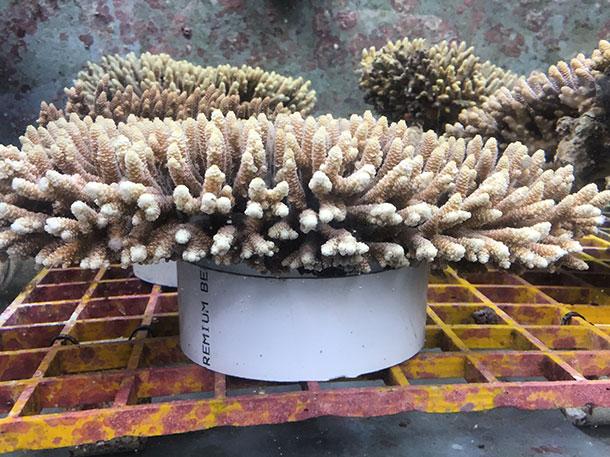A genetic tool could help scientists identify the most resilient types of corals
Acropora millepora coral, the focus of a genetic study at Stanford University, is shown. Corals spawn only once a year, under the light of the full moon.
A team at Stanford University has started using a genetic editing tool called CRISPR to identify the genes that make corals more heat-tolerant.
As the climate changes, warming oceans pose a huge threat to coral reefs. In 2016, nearly a third of the corals on the Great Barrier Reef died off. A quarter of all the fish species in the sea rely on corals for habitat, so die-offs aren’t just bad news for corals.
By using CRISPR, the team at Stanford University may be able to isolate which coral genes help them survive heat. The research is not attempting to genetically engineer a “supercoral,” says lead scientist Phillip Cleves. Instead, he explains, “the best viable option for this concept of a supercoral is finding natural supercorals in the wild.”
“What I mean by a supercoral,” Cleves says, “is that maybe there are corals out on reefs that have a natural resiliency to global climate change. We hope that using genetic tools like CRISPR to try to learn what genes are important for coral survival will allow us to eventually go through a reef and genetically scan individuals and find the corals that are more likely to survive. [Evolution] is doing the hard work of engineering supercorals for us, so it’s likely that those corals are out there. It’s our job to figure out which ones they are and then focus our conservations to make sure that they have the highest chance of survival.”
Cleves explains the process of coral die-offs this way: When ocean water temperatures rise above what corals normally experience in a region, the corals undergo a process called bleaching. Corals actually have algae that live inside of their tissue, and the algae create energy from photosynthesis and give that energy to corals as food. When water temperatures are too high, the corals expel these algae, which are critical for their survival in nutrient-poor waters.
“When the corals expel these algae and are unable able to repopulate new algae, they can starve to death and die,” Cleves says. “That’s what’s leading to this massive mortality.”
The genetic editing tool CRISPR-Cas9 is a kind of “genomic or genetic scissors” scientists can use to cut DNA in certain places and replace it with precise types of mutations.
“So, if we’re interested in what gene X does, we can remove the function of gene X, or we can add more of gene X, to see what happens in the physiology of the animal,” Cleves explains. “CRISPR has allowed us to explore gene function by editing the genomes of many, many types of organisms that were previously intractable for these types of genetic studies.”
Corals breed once a year by the full moon by releasing eggs and sperm into the water column. So, in November 2016, about a week or so after the full moon, Cleves and his team collected some eggs and sperm and injected the eggs with CRISPR-Cas9 components to make specific changes in the DNA sequence.
“The experiments that we did were generally a proof of concept to show that this technology could be applied to corals,” Cleves says. “But it was kind of a tour de force because we had to be there when the coral spawn naturally during this one week in November, induced by moonlight. So, it’s kind of romantic in that way.”
CRISPR has truly ushered in a kind of “Brave New World,” Cleves says. “We now can do experiments that we never could have even dreamed of doing. It’s been a gold standard in the coral field for decades to understand what genes give corals resiliency, and up until now we couldn’t ask those questions.”
This article is based on an interview that aired on PRI’s Living on Earth with Steve Curwood.
